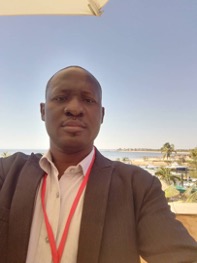Gaining Expert Knowledge

Do Étienne is the National UNFCCC Focal Point for Burkina Faso and in the coordination team of the National Communications. The PATPA network gave him in-depth access to expert knowledge – enabling him to become an expert himself.
It was in geography class in high school, when Do Étienne first felt the disquietude vis-à-vis the uncertainties of climate change. He was deeply impressed by the complexity of the different climates on planet Earth, ranging from the icy polar caps to the near-equatorial heat of his home country Burkina Faso – and by the threats climate change posed to this fragile system. He searched libraries to find the most trustworthy books and studied as much as he could to understand the correlations.
“Since that time, I dreamt of working on the climate issue”, Do Étienne remembers. He went on to study climatology and sustainable development and joined the Ministry of Environment in 2009 to do exactly that, first in the field of adaptation and since 2016 on mitigation as he was appointed Burkina Faso’s national focal point for climate change to the UNFCCC. “As a newcomer, I was granted the opportunity to fully take part into the preparatory work for the Paris Agreement”, he says. “It was an interesting task, because I was obliged to work on many different topics, some of them very complex, and we had full responsibility for them.”
One of the more complex topics the national focal point has to deal with now, is the third national communication (NC) including an updated GHG inventory to meet the requirements of the Paris Agreement, which Burkina Faso ratified in November 2016. Already, the country’s second national GHG inventory had been delayed by seven years due to the lack of technical capacities. In the preparation of the third national communication, the experts of his team again came to their limits. “We encountered many difficulties in the process because we were missing accessible data,”, Do Étienne states. “Especially calculating emissions in the Agriculture, Forestry and Other Land Use sector (AFOLU) was hard/difficult.”
The fact that many international documents are in English, really limits our momentum, so I welcome it a lot that the PATPA network offers a window for the Francophones.
Since many francophone countries in Africa are facing the similar difficulties, the Partnership on Transparency in the Paris Agreement (PATPA) offers regional workshops. One regional group is designated for French-speaking experts and is hence named the Cluster Francophone of the PATPA. The Cluster Francophone meets annually. Do Étienne participated in the workshop that was organized in February of 2019 in Senegal. “The fact that many international documents are in English really limits our momentum, so I welcome it a lot that the PATPA network offers a window for us Francophones”, he says. “Language problems can add confusion to already complex issues, so it is really great to discuss complex topics like GHG inventories in one and the same language.”
A colleague of his had visited a prior PATPA “Cluster Francophone” regional workshop in 2016 on discussing and exchanging experiences on financing strategies and policies for mitigation actions that are crucial for the implementation of NDCs. The workshop called his attention to the wide array of opportunities the network offers, especially in regard to capacity building. This time, the PATPA workshop in Senegal focused on GHG inventory methods in the waste and AFOLU sector, on the application of the 2006 IPCC Guidelines and the use of the IPCC software as a basis for submitting biennial update reports (BURs) and biennial transparency reports (BTRs). This was exactly the knowledge Do Étienne and his colleagues needed to get their updated GHG inventory going. So, he went to Senegal with two other colleagues to see what PATPA had to offer.
Through the guidance in the workshop we were able to quickly find solutions to our problems and publish the provisional report.
“I was really impressed by the level of knowledge the experts had who provided technical inputs and first thought I was the only one who found the topic extremely complex”, he says. “But then I noticed that almost everybody was feeling the same way.” In the workshop sessions, practitioners from 20 French speaking African countries received hands-on training in up-to-date inventory methods and software use. The African experts exchanged their experiences and lessons learned so far and actively practiced co-learning. This way, the workshop strengthened the network of francophone GHG inventory experts in Africa. “In the group work, I realized that I actually had an acceptable level of knowledge and could even help other people with mastering the IPCC software.”
Back in his office in Burkina Faso, Do Étienne reported to the whole team on the expert knowledge he had gained and shared the documentation. “Through the guidance in the workshop we were able to quickly find solutions to our to overcome our problems, in particular with regard to the AFOLU sector and swiftly publish the provisional report of the GHG inventory”, he says. His team is now well underway in publishing the third national communication of Burkina Faso, which includes the country’s updated GHG inventory. Francophone experts of the PATPA network now put in place the quality assurance of the inventory and implement their national MRV system. “It is really a major benefit of PATPA that it offers high quality information and guidance in French”, says Do Étienne. “I encourage the network to keep a strong emphasis on capacity building on such complex issues like the GHG inventory, because this is really an urgent need for developing countries. The French-speaking experts appreciate in particular to be able to exchange in French.”

